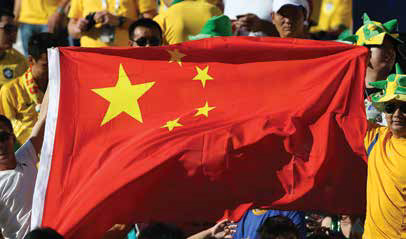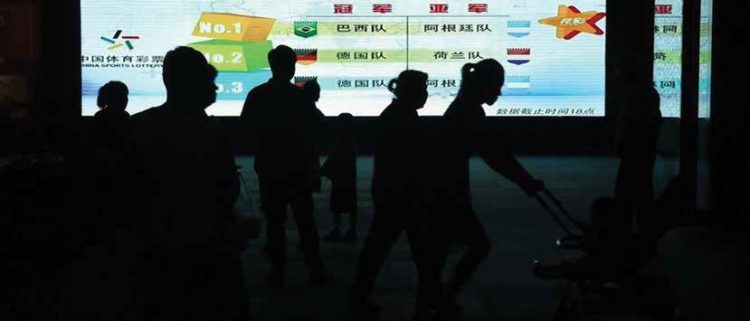Not only did last month’s World Cup fuel a spike in China’s lottery sales, particularly through online channels, but it also prompted calls for better scrutiny over the paperless lottery sector, where there has been a proliferation of gray-area ticket sales
Alth ough China’s national football team once again failed to qualify to compete in the FIFA World Cup held in Brazil last month, tens of millions of Chinese punters nevertheless avidly followed the matches and rooted for teams from other nations, with their cheers amplified by the fact their money was riding on the outcomes.
The state-run China Sports Lottery Administration Center said its football lottery sales between 12th June and 13th July reached RMB12.32 billion (US$1.98 billion), up nearly sixfold from RMB2.2 billion during the 2010 World Cup held in South Africa. Overall national sales of the Sports Lottery including football hit RMB19.24 billion in June, 83% higher than the previous year, or up more than three times from RMB6.1 billion in June 2010, figures from the Chinese Ministry of Finance show.
“The World Cup always spikes the lottery sales but this year’s result exceeds, by far, all of our expectations,” says Li Jian, co-president and founder of Beijing-based lottery research house Caitong Consultancy. “The major reason is due to the rapid development of the online sales channels, particularly the mobile Web, as the Internet sales accounted for 70% of the total in this tournament. More females and youngsters born in the 90s bet on the [football] matches with the applications on their mobile phones.”
Gambling was banned in mainland China after the Communist takeover in 1949, and only in 1987 did the state introduce the country’s two lotteries—one of them to fund the building of sports facilities, the other to fund social and welfare programs across the provinces, run respectively by state-owned China Sports Lottery Administration Center and China Welfare Lottery Issuance and Administration Center.
Ahead of this year’s World Cup, Japanese investment bank Nomura had predicted in a research note that “Most people are likely to place their bets through the Internet or through mobile apps [in China], since the time difference between China and Brazil means most matches will start when lottery shops have closed.” All World Cup matches this year took place after midnight in China’s single time zone, with the latest matches of the day kicking off at 6 a.m. Beijing time.
Nomura tipped 500.com, the only US-listed company involved in the China lottery sector, to gain on this trend because its business focuses on the online platforms. Zhengming Pan, 500.com’s chief financial officer, stated in a recent media briefing during the World Cup: “Our daily lottery sales during the tournament is about three to five times more than the normal days.”
“We should not only focus on the revenues the 64 matches of the World Cup can bring. I believe it is an important opportunity to significantly increase the penetration rate of the online lottery [among Chinese],” Mr Pan added. “It is about how to use this World Cup to entice more people who know nothing about the online lottery into the market.”
Mr Pan’s company joined forces with PPTV, a peer-to-peer video streaming Web site popular in China, to run a marketing campaign of its World Cup betting products. Before that, in January, it had inked a deal with China Mobile E-commerce, the payment subsidiary of China Mobile, China’s biggest mobile operator by subscribers, in a bid to prepare for a spike in sales this summer. Hong Konglisted lottery firm REXLot Holdings also promoted its online lottery business, okooo.com, on WeChat, the social media service provided by technology firm Tencent Holdings.
Apart from companies specifically involved in the lottery sector, China-facing technology giants were also keen to get in on the lottery boom generated by the World Cup. Big names like Tencent and Alibaba partnered with the provincial lottery centers to allow users to place bets on World Cup matches through their smartphone applications and Web sites like Alibaba’s e-commerce platform Taobao, China’s answer to Amazon.
The Chinese lottery market is expected to overtake that of the US, currently the world’s largest, by 2015, driven by the rapid rise in disposable incomes across China and an increase in the variety of bets the lotteries can offer customers. Chinese players spent over RMB309 billion (US$49 billion) on both the Welfare and Sports lotteries last year versus the US$68 billion spent on lotteries in the US in 2012, according to the latest figures available from the Chinese Ministry of Finance and the North American Association of State and Provincial Lotteries. China’s lottery sales volume in the first half of this year grew a further 19.2% year on year to RMB178.4 billion, while US sales are expected to only register single-digit growth over the next few years.
UPSIDE POTENTIAL
“The online sales only accounted for 13.6% of the total sales in China last year, far below the ratio of 30% in the developed economies,” says Caitong’s Li Jian. “There is an enormous prospect for the market coupled with the development of technology and more companies joining [the market].”

According to the research house, online lottery sales in China have ballooned from RMB100 million in 2005 to RMB42 billion last year, and are forecast to pass the RMB100 billion mark next year. State-owned CITIC Securities forecast last year that sales of paperless lottery products could grow 60% annually between 2014 and 2016, much faster than the predicted annual 20% increase in sales of all lottery products.
Though the online lottery has existed in China for more than a decade, Beijing only acknowledged its legal status at the end of 2012 by granting two companies, including a firm under 500.com, authorization—but not licenses—to sell tickets on the Internet as a pilot scheme.
The lack of licenses and uniform rules had stoked concerns in the nation prior to the kick-off of the World Cup that almost all paperless lotteries, including those available on the platforms of Tencent and Alibaba, were not technically legal. The fears were only allayed after state news agency Xinhua weighed in with a report quoting an unnamed official from the Ministry of Finance saying platforms like Taobao are “not illegal” as long as they have agreements with the provincial lottery centers to be their sales agents.
But Li Gang, associate professor of finance at Shanghai Normal University, is not convinced. He told the Financial Times, “There are only two legally authorized Web sites for online lottery sales currently. Others are dodging the policy by claiming they are lottery sales agents.”
Global Times, a mouthpiece for the Chinese Communist Party, quoted an unidentified source in the industry as saying: “It is still a gray zone, even though the authorities are trying to tighten control in the industry with several interim procedures on online lottery sales.” The source added that “Authorities seem to be allowing it as a spur to the industry’s development before any further regulation.
” The World Cup has highlighted the need for clear rules governing online lottery sales, but formulating them could be delayed because of the “vested interests involved,” says Mr Li.
Chen Haiping, professor at Beijing Normal University’s lottery research center, believes the government’s position on the sector could influence the issuance of online lottery licenses. “According to the laws, lottery tickets are issued in order to gather funds for charitable causes, not to maximize any commercial interests,” he says.
Mr Pan of 500.com says his company has not received word of when Beijing will formally issue licenses for online lottery operations, adding the government “has to be cautious”. The distribution of lottery proceeds among the central and provincial governments requires further discussion, he points out. With sales of traditional tickets, proceeds are equally divided between the central government and the provincial administration where the ticket is sold. But with the online lottery operators can sell tickets all over China rather than just within a single province, making that calculation more challenging. Some 35% of Welfare Lottery proceeds in China go to fund social projects in the country, while only 18% of Sports Lottery proceeds fund sporting infrastructure and initiatives.
The authorized football lottery returns 69% of revenues to bettors, the highest return among all types of lottery tickets, but still significantly lower than 85-90% payout ratio offered by illegal bookmakers and lottery Web sites abroad, analysts say.
“A higher payout ratio, as well as more varieties of tickets offered, has pushed some Chinese gamblers to underground betting,” says Li Jian. A study by the China Center for Lottery Studies at Peking University estimates illegal betting on football in China amounts to at least RMB600 billion each year, twice the total lottery sales recorded last year. In May, police in Shanghai detained 63 people in connection with an online gambling ring alleged to have handled more than RMB113 billion in bets.
During this year’s World Cup Chinese police busted numerous illegal betting syndicates that reportedly took in wagers totaling RMB18 billion. But the biggest bust in Asia during the month-long tournament took place in Macau, where police smashed a single syndicate that allegedly took bets amounting to HK$5 billion (US$641 million).
A Doha-based watchdog, International Center for Sport Security, warned in a May report that Asian-dominated criminal groups are laundering more than US$140 billion in illegal sports betting annually, with many gamblers coming from China.
































